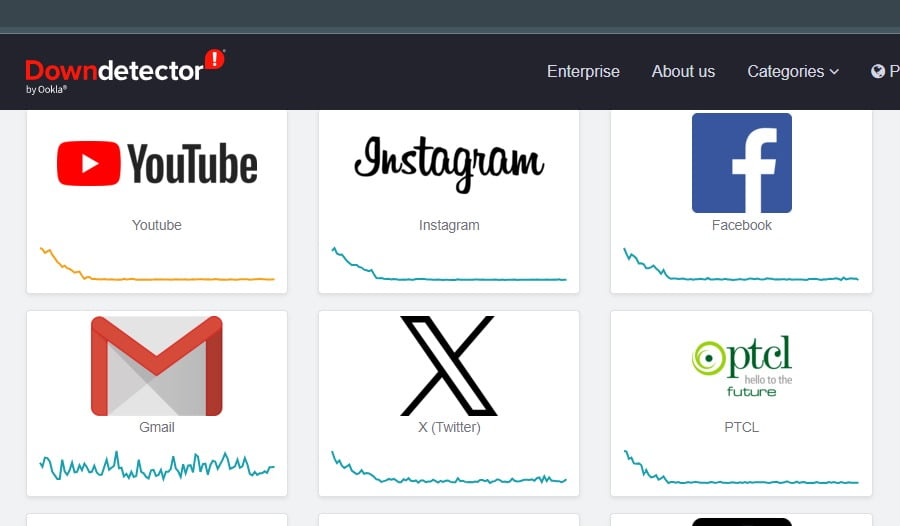On Sunday, millions of Pakistanis experienced slow or no internet access, as they tried to tune in to a “virtual jalsa” (meeting) hosted by Imran Khan, the former Prime Minister and current leader of the opposition party Pakistan Tehreek-i-Insaf (PTI).
Khan, who is facing corruption and immorality charges, had announced the online event as a way to mobilize his supporters and challenge the caretaker government ahead of the general elections.
However, many people were unable to watch the live stream or access social media platforms, as the internet speed dropped significantly across the country. According to Down Detector, a website that monitors internet outages, internet accessibility to social media platforms was zero in most of the areas of the country.


Some media outlets reported that the Pakistan Telecommunication Authority (PTA) had initiated investigations into the internet shutdown, citing anonymous sources. However, other sources denied that there was any such investigation in progress at the authority.
Many PTI supporters and activists accused the caretaker government of deliberately shutting down the internet to sabotage Khan’s campaign and suppress his voice. They also pointed out that this was not the first time that the government had resorted to such tactics.
In fact, Pakistan has a history of internet censorship and shutdowns, especially during times of political unrest or conflict. For instance, on May 9, 2023, the government ordered regional shutdowns of mobile internet access amidst violent protests following the arrest of Imran Khan. Reports indicated that mobile coverage was disrupted but wired / fixed coverage continued. Various media stories reported blocking of social media sites such as YouTube and Twitter.
According to a report by the digital rights group NetBlocks, the internet shutdown on May 9 cost the country millions of dollars in economic losses. The report also stated that internet shutdowns have a negative impact on human rights, public safety, education, health, and democracy.
Moreover, internet shutdowns are not the only reason why Pakistanis suffer from poor internet quality and speed. Pakistan ranked 118 out of 141 countries in terms of mobile internet speed and 150 out of 178 in terms of fixed broadband speed, according to the Speedtest Global Index 2022. The average download speed for both categories ranged from 10.15 to 15.5 Mbps, far below the global average of 55.34 Mbps for mobile and 106.61 Mbps for fixed broadband.
Pakistan also came last out of 22 countries in Asia on the Inclusive Internet Index 2022, which measures the availability, affordability, relevance, and readiness of internet access. The index ranked Pakistan 79 out of 120 countries globally, indicating that the country has a long way to go to achieve universal and inclusive internet access.
One of the main reasons for the low internet speed and quality in Pakistan is the lack of investment and competition in the telecom sector. Internet service providers (ISPs) intentionally keep a squeeze on the speed because then the consumers will use more and their costs will multiply. Internet speed is also kept in check for domestic consumers to keep the load off of towers and boosters because corporate clients could use it easily.
Another reason is the inadequate and outdated infrastructure and technology that hampers the delivery and distribution of internet services. Pakistan relies heavily on submarine cables for international connectivity, which are prone to damage and disruption. The country also lacks sufficient domestic fiber optic networks and wireless spectrum to meet the growing demand for internet access.
Furthermore, the government policies and regulations that govern the internet sector are often inconsistent, unclear, and restrictive, creating uncertainty and barriers for ISPs and users. For example, the government imposes high taxes and fees on internet services, making them unaffordable for many people. The government also exercises tight control over the internet content and activity, blocking and filtering websites and applications that it deems objectionable or harmful.
The internet shutdown in Pakistan on Sunday was a stark reminder of the challenges and issues that the country faces in terms of internet access and quality. It also highlighted the need for reforms and improvements in the telecom sector, as well as the protection and promotion of digital rights and freedoms. As Pakistan prepares for the upcoming elections, the internet will play a crucial role in enabling the people to participate and engage in the democratic process. Therefore, it is imperative that the internet is not only available and accessible, but also open and free for all.